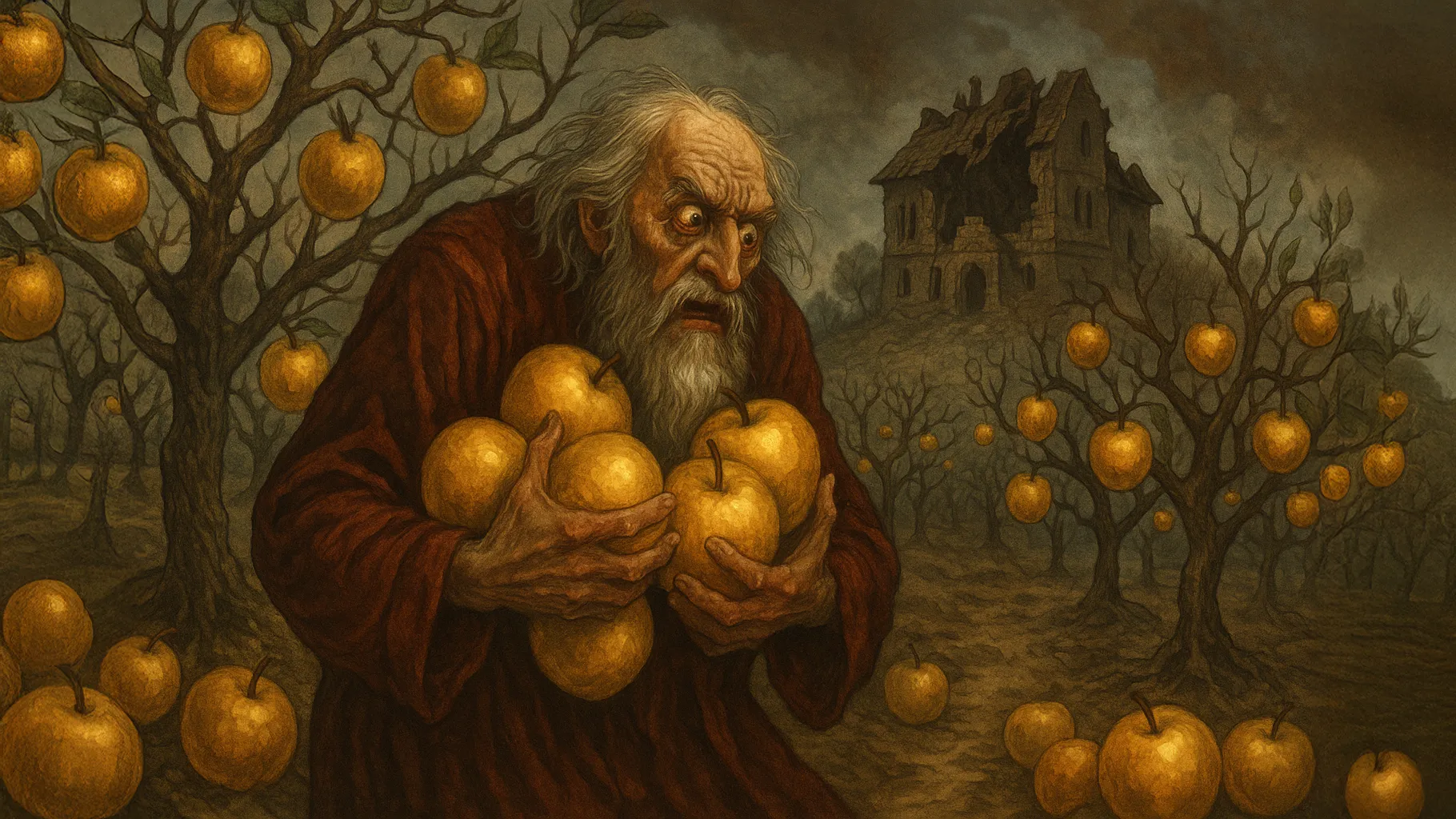Long ago, in a lush valley wrapped in mist and myth, there stood the orchard of Old Marnak—a man so rich his very shadow looked down on others. His land stretched further than the eye could see, filled with trees so heavy with golden apples that their branches creaked under the weight.
But not a soul had ever tasted one.
Marnak was a miser. He did not eat the apples. He did not sell them. He simply had them. To him, possession was power, and power was everything. He built great walls around his orchard, hired guards dressed in black armor, and set traps between the trees to catch even a bird that might dare nibble his fruit.
The village of Greenglen lay just outside those walls, poor and hungry. Seasons came and went, crops failed, and children cried for food. But Marnak never looked out his window.
One bitter winter, a young girl named Lira trudged up the hill to his gate. Her dress was patched, her boots full of holes, and her hands held a single empty basket.
“Please, sir,” she called through the iron bars, “my brother is sick. One apple could save him.”
Old Marnak appeared at the gate, wrapped in a velvet robe, his white beard curling like smoke. He peered down at her as though she were a stain on his doorstep.
“Why should my apples feed your brat?” he spat. “Let him starve. The world owes him nothing.”
And he turned his back.
Lira did not cry. She only bowed her head and whispered, “One day, you will hunger, too.”
That night, as the wind howled and the moon disappeared behind clouds, a stranger entered the valley. Her cloak shimmered with stars, her eyes glowed like candlelight, and her staff was carved from twisted elderwood.
She walked into the orchard as if the walls did not exist.
Wherever she stepped, frost bloomed. With one graceful sweep of her hand, every apple on every tree turned to stone. The leaves shattered into ice. The bark split with cold.
And in a voice that echoed like thunder, she said:
“What is hoarded will harden.
What is shared shall grow.
Let him eat what he sowed.”
By dawn, the orchard was silent. Marnak woke to find his trees lifeless. No birds sang. No breeze stirred. The apples glittered like gold, but they were solid as marble.
He screamed. He raged. He accused his workers of sabotage. He whipped his guards, burned his furniture, and cursed the heavens. But nothing changed.
And then came the whispers.
At first, they rustled faintly in the corners of his mansion—soft voices murmuring “More…” He blamed the wind.
But the whispers grew bolder, louder, closer.
They hissed from his coin piles. Slithered from behind locked doors. They crooned from the stone apples themselves: “Feed us. Count us. Hide us.”
Sleep fled him. Sanity cracked.
Marnak dug holes across his orchard, burying his gold, hoping to bury the whispers. But they only laughed, deep and low.
The villagers watched from afar. They no longer feared him. They pitied him.
Then, one stormy night, a terrible sound echoed across the valley—like a final gasp from a dying beast. The earth beneath Marnak’s mansion split wide. Lightning struck the orchard, and fire lit the sky.
When morning came, the mansion was gone.
In its place grew a single, radiant apple tree—green and alive, despite the ruin around it. Its branches were heavy with fruit, red and sweet.
The villagers gathered. No guards stopped them. No walls barred their way.
Lira, now older, stepped forward and plucked the first apple. She took one bite and smiled. “He could’ve saved my brother,” she said quietly. “But he gave us this instead.”
The orchard never returned. But the lone tree fed Greenglen for generations. And when the villagers told the tale, they ended it with the same words, passed from parent to child:
“Greed turns gold to stone and hearts to ash.
Give, or you’ll vanish with your stash.”
